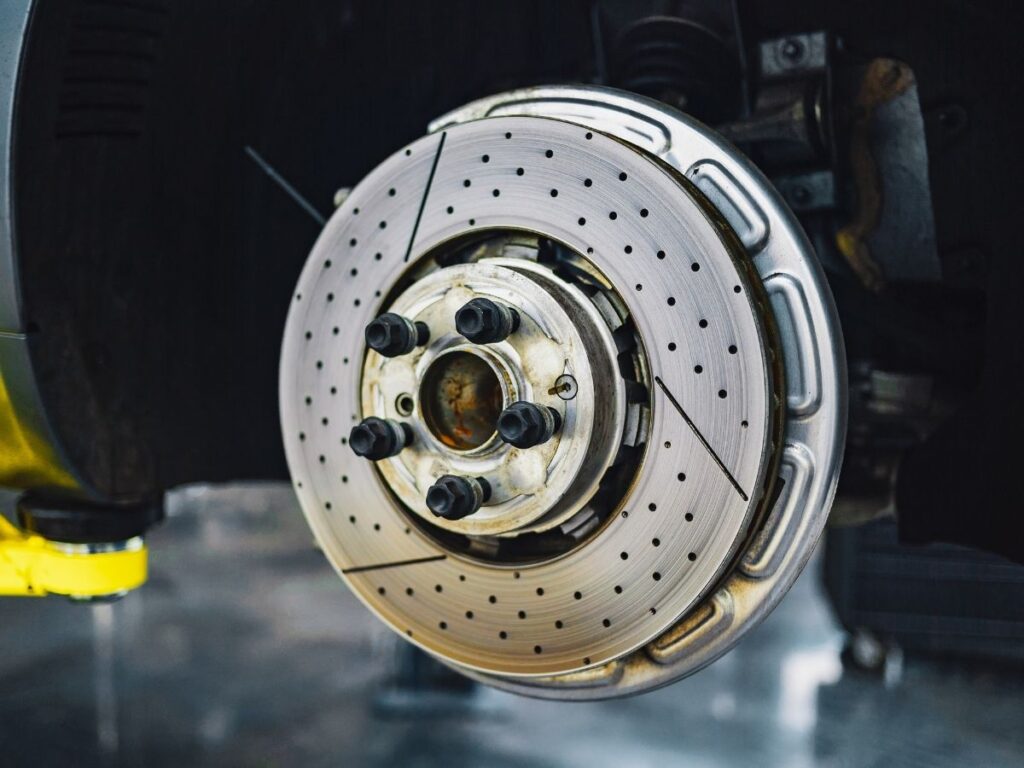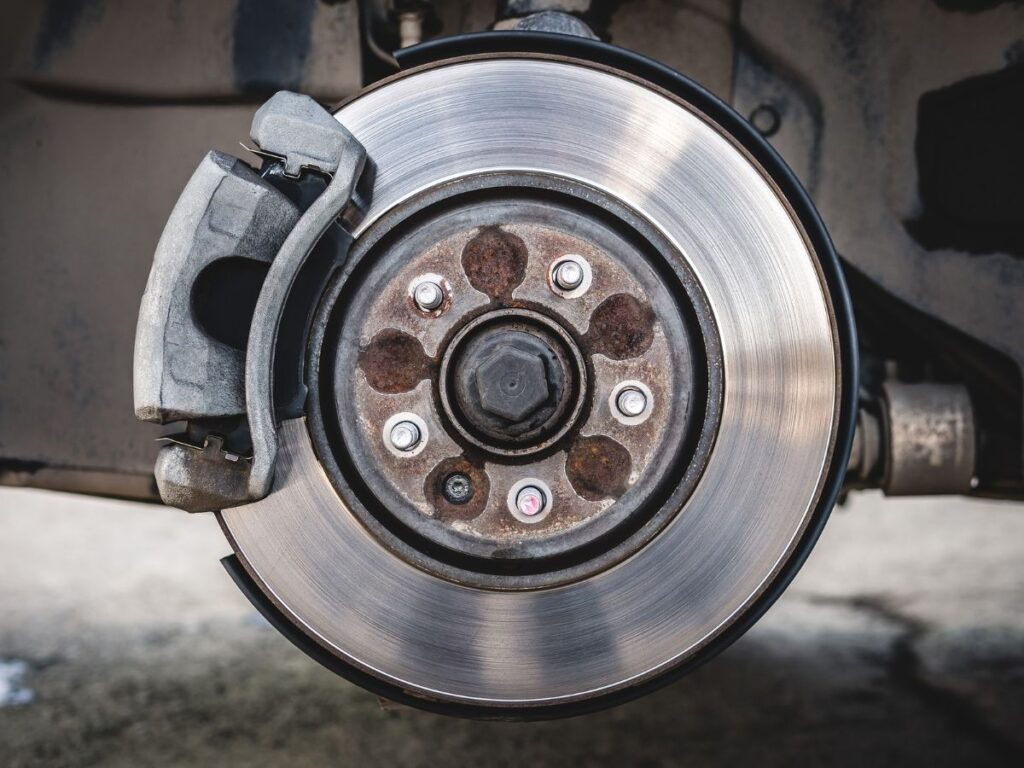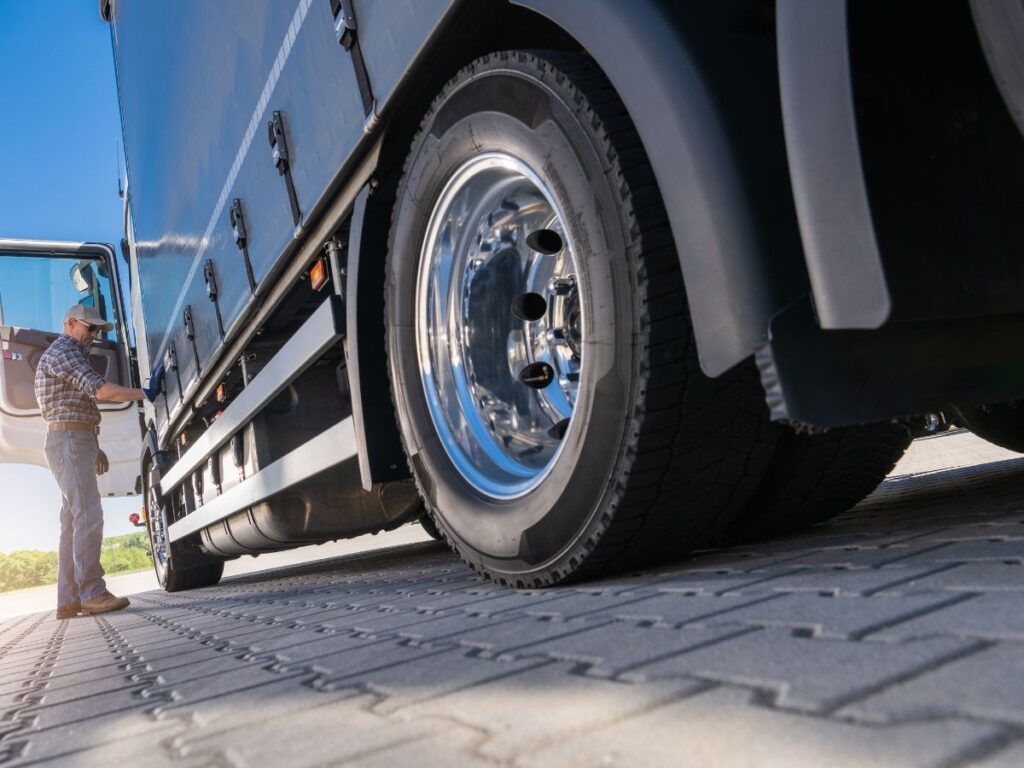I once hit the brakes on a steep job site and nothing happened.
The trailer kept rolling. That day, I realized not all trailer brakes are built the same.
Since then, I’ve worked with both hydraulic and electric systems across all kinds of trailers—construction, transport, agriculture.
I’ve tested them. I’ve fixed them. I’ve seen what works in the real world.
If you’re trying to choose the right brake system, this guide will help.
You’ll get a clear comparison of performance, maintenance, cost, and trailer fit—so you can pick the one that actually works for your job.
So let’s start!
Quick Comparison Table
Before we dive deeper into the full breakdown, here’s a quick glimpse at how electric and hydraulic trailer brakes stack up.
This table gives you a fast way to spot the key differences—so you can start thinking about what fits your trailer best.
| Feature | Electric Trailer Brakes | Hydraulic Trailer Brakes |
| How They Work | Use electric signals from a brake controller to power magnets inside the drum | Use brake fluid pressure to activate pistons and apply brake force |
| Best For | Light to medium loads on paved or highway roads | Heavy loads, off-road, steep terrain, or high-demand hauling |
| Initial Cost | Lower upfront cost; fewer components | Higher cost, especially with electric-over-hydraulic systems |
| Installation | Easier and quicker to install; often plug-and-play | More complex; requires hydraulic lines, actuator, and bleeding fluid |
| Maintenance | Easier to repair; parts like magnets and shoes are easy to replace | More time-consuming; requires fluid checks, leak repair, and line maintenance |
| Adjustability | Manual—adjust brake force using a cab-mounted controller | Automatic—adjusts naturally with pressure and load |
| Response Time | Fast, but depends on brake controller settings | Smooth and steady; excellent for heavy, shifting loads |
| Road Conditions | Performs best on dry, even pavement | Handles mud, water, gravel, and slopes better |
| Power Source | Requires vehicle wiring and battery | Fluid-based; some systems (EOH) still need a power source |
| Long-Term Cost | Lower if used with lighter loads and fewer miles | May cost more upfront, but lasts longer under heavy use |
| Common Trailer Types | Cargo, utility, RVs, small flatbeds | Dump trailers, equipment haulers, tankers, livestock, boat trailers |
| Manual Override (Braking) | Yes, through the controller | Surge brakes: no manual override; EOH: yes with controller |
1. What Are Hydraulic Trailer Brakes?
A few years ago, I was hauling a mini-excavator through a muddy job site.
Steep hills. Wet ground. Not the best mix.
I had hydraulic brakes on that trailer, and I still remember how smooth the stop felt—no jerking, no delay. That was the moment I realized just how much brake type matters.
Hydraulic trailer brakes are known for that kind of smooth, reliable stopping power. If you’ve ever hauled heavy equipment or livestock, you’ve probably used them—or at least heard someone talk about them.
Let’s break it down in simple terms.
How Do they Work?
Hydraulic systems use fluid pressure to slow your trailer down. Here’s what happens:
- You press the brake pedal in your tow vehicle
- That pushes brake fluid through a line
- The fluid reaches the trailer’s brakes
- Pistons move and press brake pads against the wheel drum or rotor
- The trailer slows or stops
No electronics. No brake controller. Just pressure doing its job.
To me, this setup feels more “mechanical”—like old-school muscle. It’s simple but powerful. And it’s great when you’re in wet, rough, or steep conditions where you don’t want to rely on wiring.
Common Uses
I’ve seen these brakes mostly on trailers that deal with tough jobs. Think:
- Dump trailers on construction sites
- Livestock trailers running through pastures
- Equipment haulers for backhoes, lifts, or tractors
- Boat trailers, especially around water ramps
If your trailer gets dirty, wet, or loaded down—you might want to give hydraulic systems a serious look.
Types of Hydraulic Brake Systems
Surge Brakes
These are super common on boat trailers. They don’t need wiring or a controller.
When the trailer pushes forward during a stop, a master cylinder in the hitch compresses. That creates pressure and applies the brakes.
Good stuff:
- Simple setup
- No brake controller needed
Downside:
- You can’t control them manually
- They lag a little on steep hills or emergency stops
I’ve had good luck with them on short, local hauls—but I wouldn’t use them for cross-country loads.
Electric-Over-Hydraulic (EOH)
This one’s a bit more advanced. It combines electric signals with hydraulic power.
Your in-cab brake controller sends a signal to a pump. That pump builds pressure—and applies the brakes fast.
Why I like it:
- You get that strong hydraulic feel
- But you also get in-cab control, like electric brakes
Things to keep in mind:
- It costs more
- You’ll need wiring, a battery, and a little setup time
So which one fits you?
If you’re hauling heavy loads, or driving in places where electric systems can struggle—hydraulic brakes might give you the edge.

2. What Are Electric Trailer Brakes?
Electric trailer brakes are one of the most common systems out there—especially for trailers that stick to highways or light commercial routes.
I’ve used them on flatbeds, utility trailers, and a few RVs over the years. What I noticed most? The stopping power feels smooth and controlled, like the trailer is responding with me, not against me. No lag. No sudden pull. Just a steady, even stop.
They’re a good fit for light to medium-duty work—and when wired right, they’re reliable.
How Do They Work?
Electric brakes don’t use fluid. They run on signals from your tow vehicle. Here’s how the process works:
- You press the brake pedal in your truck or SUV
- A device called a brake controller sends an electric signal to the trailer
- That signal powers electromagnets inside each wheel’s brake drum
- The magnets press against a spinning surface in the drum
- That motion pulls the brake shoes outwards
- The shoes press against the drum wall, and the trailer slows down
You can adjust the brake force using the controller in your cab. That’s helpful if your load changes from day to day. Light cargo? Dial it down. Full load? Crank it up for stronger braking.
Common Use Cases
You’ll mostly see electric brakes used in everyday hauling jobs like:
- Cargo and enclosed trailers
- Utility trailers
- Small RVs and campers
- Light flatbeds for tools or supplies
A neighbor of mine hauls landscaping gear five days a week. His trailer uses electric brakes. He told me, “Once you get the settings right, it’s like the trailer just follows your lead. No drag, no surprises.”
But here’s the catch—these systems depend on clean wiring and a strong battery. I’ve seen trailers lose braking power because of corrosion or weak voltage. That’s why I always check plugs and wires before a trip.

3. Which Brake Type Fits Your Industry Best?
Different jobs need different trailer brakes.
What works for a landscaper probably won’t hold up for a mining crew.
I’ve worked with folks across all kinds of industries—construction, farming, fuel hauling, and more. Each one has its own terrain, loads, and trailer needs.
Construction and Heavy Equipment Hauling
If you’re hauling excavators, skid steers, or concrete forms, your trailer’s under a lot of weight. In my experience, hydraulic brakes—especially electric-over-hydraulic—handle this kind of load better.
Why?
They provide stronger stopping power and respond better on rough or uneven job sites.
I once helped a contractor switch from electric to hydraulic brakes on his low-bed trailer. He said it felt like “someone finally put the brakes on properly.”
Go with:
- Hydraulic or Electric-over-Hydraulic brakes
- Great for dump trailers, tilt decks, and lowboys
Mining and Off-Road Applications
Mining roads are steep, dirty, and often unpredictable. Hydraulic brakes shine here. They don’t rely on electricity, which can fail in wet or dusty conditions.
If you’re pulling trailers through gravel or remote areas, you need brakes that work even when the wiring doesn’t.
Go with:
- Surge brakes or hydraulic drum/disc setups
- Ideal for water tankers, service trailers, and support rigs
Logistics and Long-Haul Transport
Do you spend most of your time on highways?
Are your loads packed in enclosed or flatbed trailers?
Then electric brakes may be the better match. They’re lighter, easier to maintain, and let you adjust braking pressure with a controller in your cab.
Go with:
- Electric brakes
- Good for cargo, box, and step-deck trailers
Agriculture and Farm Use
Farmers deal with mud, hills, and heavy loads—grain, hay, livestock. I’ve seen both brake types work well, but it depends on the trailer.
Electric brakes are fine for lighter utility trailers. But if you’re hauling cattle or working on slopes, hydraulic offers more control.
Go with:
- Electricity for light loads
- Hydraulic for livestock or large field equipment
Fuel, Gas, and Liquid Hauling
Liquid loads shift. Fast.
You need brakes that respond smoothly and powerfully.
Hydraulic systems—especially EOH—are often used on fuel tankers and chemical haulers for that reason. They react quickly and help control sway.
Go with:
- Electric-over-Hydraulic
- Used for fuel, water, and chemical transport trailers
So—what do you haul?
Once you know your terrain, your load, and your work rhythm, the right brake system becomes clear.

4. Control and Braking Performance
Braking isn’t just about coming to a stop. It’s about how much control you have while doing it—especially when hauling heavy loads or driving in tough conditions.
I’ve seen trailers that stopped too slow. Others that stopped too fast and caused sway. The right brake system can make all the difference in how your trailer feels behind you.
Stopping Power and Response
Hydraulic brakes are known for their smooth, strong stopping. Since they use fluid pressure, they don’t need a brake controller to react. The pressure builds evenly and applies force in a clean, controlled way. I’ve always felt more confident with hydraulic brakes under a full load—they don’t grab or fade like some electric setups can.
Electric brakes rely on your brake controller. When the controller is dialed in, response time can be fast. But if your settings are off, the brakes might feel jumpy or too soft. You’ll notice it right away, especially when going downhill or stopping suddenly.
On-Road vs Off-Road Use
If your trailer stays on paved roads, electric brakes usually do the job. They’re quick, quiet, and easy to maintain. But if you’re hauling through rough or wet terrain, hydraulic systems hold up better. They don’t rely on wires or power. I’ve had electric brakes cut out on bumpy roads, but my hydraulic brakes kept working without a hitch.
Braking With Different Loads
Every haul is different. One day your trailer might be empty. The next day it’s packed. Hydraulic brakes handle those changes without needing adjustments. The braking stays smooth either way.
Electric brakes work too—but only if you adjust your controller to match the load. Forget to do that, and the trailer could feel like it’s dragging or pushing.
If you want smoother control under pressure, especially off-road or with heavy loads, hydraulic brakes often come out ahead. For light-duty hauling on pavement, electric brakes still give you reliable stopping—just be ready to keep an eye on the settings.
5. Load Handling and Weight Compatibility
When you’re towing a trailer, weight matters—and so does how your brake system handles that weight. If your trailer is too heavy for your brakes, stopping becomes harder, riskier, and more stressful.
Let’s look at how hydraulic and electric brakes compare when it comes to load handling and weight compatibility.
Which System Handles More Weight?
If you haul heavy loads, hydraulic brakes are often the better choice. They use fluid pressure that builds naturally as you press the pedal. That pressure gives you stronger and more consistent braking—especially with large or uneven loads.
I’ve towed construction trailers loaded with machinery, and the hydraulic system never felt like it was fighting back. It stopped smooth, even on steep grades and rough terrain.
Electric brakes can handle decent weight too. But once you start hauling heavy or shifting loads, they don’t feel quite as strong. Their braking power depends on a signal sent from your brake controller. If that signal is weak—or not adjusted properly—the brakes won’t bite as hard as you need.
How Well Do They Adjust to Different Loads?
Hydraulic systems adjust automatically. You don’t have to do anything. Whether your trailer is half-loaded or full, the brake force builds based on how much pressure you apply. That means smoother stops and fewer surprises.
Electric brakes require manual adjustment through the brake controller. If you forget to change the settings, your trailer might:
- Drag when braking (if the setting is too high)
- Push your tow vehicle (if it’s too low)
I’ve made that mistake myself. One trip, I loaded extra equipment but didn’t adjust the controller. Every stop felt like I was dragging a stubborn cart. That wouldn’t have happened with hydraulic brakes.
6. Licensing, Road Laws, and Compliance
Before you hit the road with your trailer, it’s important to know what’s legal—and what’s not.
Brake laws can change depending on where you live or where you’re hauling. Whether you’re crossing state lines or staying local, you need to follow the rules. I’ve seen haulers get stopped just for using the wrong brake setup on the wrong trailer.
What Are the Legal Requirements?
Most regions have weight limits that decide whether brakes are required—and what type.
Here are some common examples (check your local laws to be sure):
- In the U.S., trailers over 3,000 lbs typically need brakes on at least one axle (FMCSA)
- In Canada, brakes are required when trailer weight is over 1,360 kg (3,000 lbs)
- In Australia, trailers over 2,000 kg (4,409 lbs) must have brakes on all wheels, and electric brakes are required for anything over 4,500 kg
If you’re using your trailer for commercial hauling, the rules are often stricter. Some states and provinces also require a specific type of brake—like electric or hydraulic—for certain trailers. You may even need breakaway systems, which stop the trailer if it disconnects from your vehicle.
What About Licensing?
If you’re pulling heavier trailers, you may need a higher class of driver’s license.
For example:
- A Class A CDL is required in the U.S. for trailers over 10,000 lbs combined with a heavy tow vehicle
- In the UK, different categories apply depending on the Maximum Authorised Mass (MAM)
Why It Matters
Staying legal keeps you on the road and out of trouble.
So if you’re shopping for a brake system, don’t forget to check your local towing laws, commercial vehicle codes, and license limits.
You don’t want to invest in a system—only to find out it doesn’t meet the rules where you work.
7. Maintenance and Cost Over Time
Buying trailer brakes isn’t just about the upfront price.
It’s about what they cost you over the long run—time, money, and maybe even stress.
I’ve worked on both hydraulic and electric brake systems. Some were smooth to deal with. Others? Let’s just say I spent more time underneath the trailer than I wanted to.
Let’s talk about what it really takes to keep each system running.
Upfront Costs
If you’re on a budget, electric brakes are usually cheaper to install.
You’ll need:
- Brake assemblies
- Wiring
- A brake controller in your vehicle
Most setups are straightforward. You can even install them yourself if you’re handy with tools.
Hydraulic brakes, especially electric-over-hydraulic (EOH), cost more upfront.
You’re paying for:
- Hydraulic lines
- A brake actuator or pump
- Stronger brake components
When I helped a friend install an EOH system on his heavy hauler, he looked at me and said, “Feels like I’m buying two trailers just for the brake parts.” He wasn’t wrong—but the performance was worth it for his job.
Maintenance and Repairs
Electric brakes are easier to maintain. You can check the wires, adjust the controller, and replace worn magnets or brake shoes without much hassle.
Hydraulic brakes take more work. You have to check fluid levels, look for leaks, and bleed the lines when air gets in. If the actuator fails, it’s not a quick fix. And good luck finding parts fast in a remote town—I’ve tried.
That said, hydraulic systems tend to last longer when used in the right setup. They’re built for heavier work, so the parts wear slower under stress.
Long-Term Costs
If you’re driving daily or hauling serious weight, hydraulic brakes may save you money in the long run. Fewer breakdowns. Fewer replacements.
But if your hauls are light and occasional? Electric brakes will likely cost less over time—in both parts and labor.
8. Ease of Installation and Compatibility
Installing trailer brakes isn’t just about tools—it’s about time, fit, and frustration. I’ve helped install both hydraulic and electric systems, and I’ll be honest: some jobs go smooth, others feel like a maze of wires, lines, and guessing.
If you’re thinking about switching brake types or setting up a new trailer, here’s what you should know.
How Well Do They Fit Your Setup?
Electric brakes are often an easier match. Most trailers today are already wired for electric systems, and many trucks and SUVs come with a brake controller or at least a port ready for one. You plug it in, mount the controller, and connect the trailer harness.
If you’ve got a standard cargo trailer or flatbed, there’s a good chance electric brakes will fit without major changes.
Hydraulic brakes, especially electric-over-hydraulic (EOH), need more parts—and more planning. You’ll need:
- A hydraulic pump or actuator
- Brake fluid lines
- A compatible in-cab controller
- A 12V power source in the trailer
One time, I helped a farmer upgrade his livestock trailer to hydraulic. We were crawling under the frame, feeding fluid lines along the rail, trying not to spill brake fluid all over the gravel. He laughed and said, “I thought this was supposed to be an upgrade.”
It was—but it took us 2 full days.
How Hard Is Installation?
If you’re handy and working with an electric brake system, you could do it in a few hours. The wiring is usually color-coded. The toughest part might be mounting the brake controller inside your cab and adjusting the gain settings.
Hydraulic systems take more time. You have to mount the pump, route lines carefully, and bleed the system to remove air. If you’re not used to working with brake fluid, it can get messy—fast.
What Should You Think About?
Ask yourself:
- Is your tow vehicle brake-controller ready?
- Does your trailer have wiring or lines in place already?
- Do you have the time (or help) to do the install right?
If you want a fast install and plug-and-play setup, electric brakes are usually the easier choice.
If you’re ready for a bit more work—and want higher performance under load—hydraulic may be worth the time.
9. Which One Should You Choose?
You’ve gone through the details. You know how each brake system works. But maybe you’re still stuck—electric or hydraulic? What fits your trailer, your load, and your budget?
Let me walk you through it, the way I would with someone standing next to me in the yard, trailer hooked up, asking, “Which one should I go with?”
What Are You Hauling?
Your brake system should match the job.
If you’re hauling light loads on smooth roads, you don’t need a complex setup. But if you’re pulling heavy equipment or driving rough terrain, your brakes need to work harder—and smarter.
Think about your average day. Are you hitting the highway with a few tools in the back? Or backing down steep slopes with 10,000 lbs behind you? At Rhinotrail, our trailers are built to support both electric and hydraulic braking systems—so you can choose the setup that matches your load, terrain, and work style.
Simplicity or Strength?
I’ve seen both systems in action, and each has its place.
One friend hauling lumber started with electric brakes. They were easy to install and worked fine—until the loads got heavier and the hills got steeper. That’s when he started thinking about hydraulic.
At Rhinotrail, we know these decisions depend on the job. That’s why our trailers are designed to work with both electric and hydraulic brake systems. Whether you’re looking for simple and affordable or strong and load-ready, the setup should match your hauling needs.
Choose Based on Your Work
Here’s the bottom line.
If your trailer is light, your roads are flat, and you want something easy—go electric.
If you’re pulling weight, driving tough routes, or working daily—hydraulic is the better fit.
Match your brakes to your workload.
Do that, and every stop will feel like the right decision.
Conclusion
We broke down how electric and hydraulic brakes work, what they cost, and when they fit best.
Now it’s time to decide what makes sense for your trailer—a simpler electric setup or a stronger hydraulic system.
Don’t guess. Don’t settle. Make the choice that fits your load, terrain, and towing needs.
Still unsure? Contact us today.


